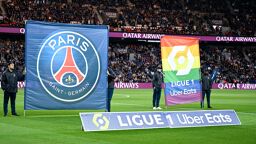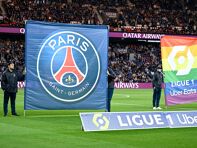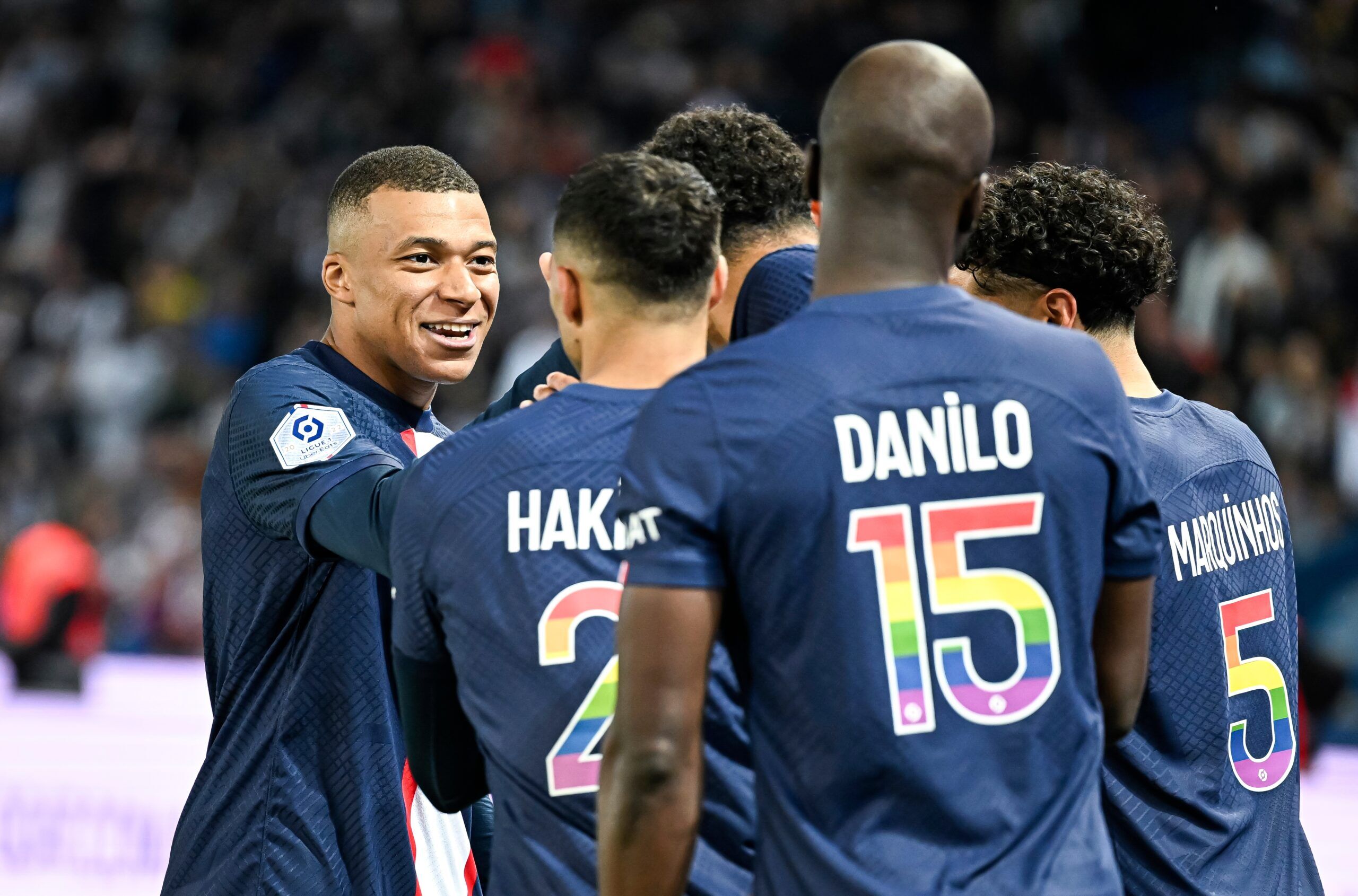The annual switching of shirt numbers into Pride colors in French men’s soccer has been one of the most eye-catching LGBTQ activations in domestic elite sports in recent years.
However, the end of the rainbow numbers has now been announced by the Ligue de Football Professionel (LFP), organisers of the top two divisions Ligue 1 and Ligue 2 — and for inclusion in sports groups that were also partners on the campaign, there is regret, division and accusations of backpedaling. The decision comes after at least six players refused to wear the jerseys with the rainbow numbers the past two years.
World-class stars like Lionel Messi, Kylian Mbappe and Neymar have all worn the special edition jerseys since the anti-homophobia initiative in France began back in 2021.
However, it emerged after the designated match round in 2022 that Senegal international Idrissa Gueye had withdrawn from the PSG squad for that fixture, having done the same the previous year too, to avoid having to wear rainbow colors on his shirt.
Get off the sidelines and into the game
Our weekly newsletter is packed with everything from locker room chatter to pressing LGBTQ sports issues.
Then in 2023, at least five players chose to sat out their respective teams’ matches for the same reason.
The LFP has now connected the campaign to its anti-racism awareness drive, which was marked across games last weekend. The LGBTQ inclusion element will still be activated separately on or around May 17 (the International Day Against Homophobia, Transphobia and Biphobia) but the presentation will be muted in comparison.
Now, only the small LFP logo, displayed on a badge on each player’s shirt sleeve, is set to be displayed in rainbow colors. On the other sleeve will be a black badge with the word ‘Homophobie’ crossed out and ‘Football’ written next to it in red.
As a result of these changes, two of the LFP’s partner organizations, SOS Homophobie and Paris-based LGBTQ-inclusive club PanamBoyz & Girlz United, have said they are pulling out of the activation.
PanamBoyz president Bertrand Lambert told L’Equipe: “In recent years, we’ve been ramping up, moving from rainbow-colored laces, to captains’ armbands and then player numbers on jerseys over the last three seasons.
“We are shocked by the way in which the symbol of the LGBT+ fight against homophobia will be made invisible.”
Referring to the player withdrawals last season, Lambert said: “It gives the impression of vindicating those who refused to wear it.”
He also hinted at more trouble ahead, claiming that when the LFP presented the concept of a rainbow logo on a shirt sleeve to players in workshop sessions, some replied that wearing the much smaller badge was a problem for them too.
There is no consensus among the former campaign partners, however.
Yoann Lemaire was the first French amateur footballer to come out publicly as gay in 2004. He went on to found Foot Ensemble, which delivers anti-homophobia training to clubs and academies in partnership with the LFP and also the French Football Federation.
Lemaire believes the change is justified. “It hurts our hearts,” he told L’Union. “We loved the rainbow jersey, but it is a necessity, a better strategy to ease the problem and have a chance to bring everyone into the fight against homophobia in football.”
Referring to the player withdrawals, he added that “we only remember the controversies” — but he believes dedicated time to talk to players about the issue in workshops is where progress can be made.
“Young players of 18, 19 years old… they did not seem homophobic but explained to me that it was still a problem for them to wear this jersey.
“Perhaps we should stop. We will have the feeling of going backwards, but it’s more important to increase the number of workshops and to get the players to think differently about the question.”
It was back in Pride Month 2017 that the U.S. men’s and women’s national teams first wore rainbow shirt numbers. The USMNT did the same the following year in a friendly against the Republic of Ireland.
Ligue 1 was known to be the only major men’s pro top-flight league in which shirt numbers on every team switched to rainbow once a season.
The need for such a campaign was again brought into sharp focus Friday night when homophobic chanting could be heard during Lille’s 2-1 win over Lens. La Voix des Sports reported that the video replay of the full game was taken down from Amazon Prime as a result.
There was also an incident of anti-gay chanting at Marseille’s home game against Paris Saint-Germain on Sunday.
That fixture is known as “Le Classique” and is regularly marred by homophobia. After September’s meeting in the French capital, gay former player Olivier Rouyer said abandonment and points deductions from clubs should be considered.
Related


Deduct points or abandon games for homophobic chanting in France, says gay ex-player
The biggest game in French soccer was marred by homophobic chants last weekend. Gay former player Olivier Rouyer says it’s time to get tough.
By Jon Holmes | September 27, 2023
Since the weekend, two other campaigning organizations — Rouge Direct and Stop Homophobie — have stepped up pressure on the French authorities to act.
Meanwhile, for PanamBoyz secretary Alix Chosson, the LFP’s decision to reduce visibility in May will make education more difficult and discourage LGBTQ people in French football. “For us, it’s backpedaling,” she told France TV Info.
“When you have an Mbappé, a Messi, in a photo wearing this jersey, it is a very strong message sent to the supporters, and to the players who cannot be who they are when they are on the pitch.”








































